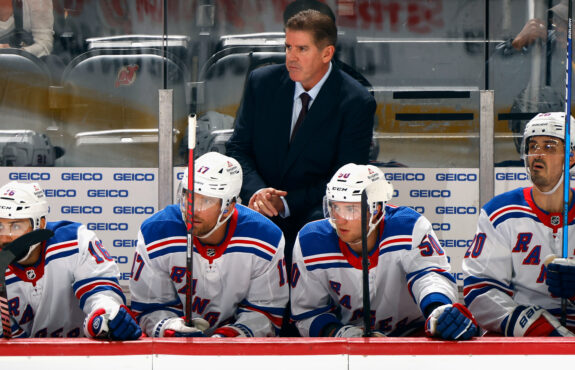When the New York Rangers parted ways with former head coach Gerard Gallant and his staff in May, a clear message was sent that whoever was brought in to coach this group had one goal: to win the Stanley Cup. The man general manager Chris Drury chose to lead his squad was Peter Laviolette. Laviolette, alongside Phil Housley, Michael Peca, and Dan Muse have done a fantastic job changing the team’s culture.
The influx of a new structure and culture has propelled the Rangers to the top of the NHL standings, with the Blueshirts reaching the 50-point mark faster than any of their peers. They are on a 119-point pace and are well on their way to securing home ice in the postseason, something they did not have when they fell in seven games to the New Jersey Devils last season.
Rightfully so, there are questions of whether the Rangers can sustain this level of play. Yes, they have great goaltending and talent up and down the lineup. However, they remain heavily dependent on their special teams and have yet to figure out how to thrive at five-on-five. That criticism is fair and warrants questioning the Rangers’ ability to keep playing at such a high level.
When the Rangers face off against the Carolina Hurricanes on Jan. 2, their first game of 2024, they will look to show the hockey world that they can sustain this successful style of hockey despite not being the prettiest analytically or stylistically every night.
Where the Rangers Can Improve
You are doing something right whenever you sit atop the league in wins, points, and points percentage. That is the case for Laviolette’s club this season, but that doesn’t exempt them from having areas in which they can improve. Analytically, five-on-five is the area that stands out as needing vast improvement.
According to Natural Stat Trick, the Rangers rank 19th in the NHL at Corsi-For (CF%) at five-on-five with a meager 48.99%. Despite outscoring their opponents at full strength, their Expected Goals For (xGF%) is below 50%, at 49.57%, which ranks 18th.
High Danger Chances (HDCF%) are another area where the Rangers are 19th in the league. Just 49.46% of the high-danger chances at five-on-five have been for the Rangers. These marks are not awful, but for a team that has notoriously struggled at full strength, there needs to be an emphasis on improvement.
Related Story: Filip Chytil’s Latest Injury Raises Questions About Rangers Future
If the Rangers could get those numbers over 50% — controlling play at five-on-five in addition to their superb special teams — their remarkable start to the season will surely be sustainable. The even-strength numbers must start trickling toward the mean.
During the early portion of the season, the Rangers were brilliant at five-on-five under Laviolette. As Igor Shesterkin struggled and the team started to leak more Grade A chances against, the advanced stats started their downward trajectory. Shesterkin has since righted the ship, but the Rangers are still giving up more at five-on-five than earlier.

For the Rangers to reach the level of dominance and success they hope to achieve, improvements must be made. To start, the Blueshirts must improve their play at five-on-five and control the pace of play more often than they are right now.
Rangers Have Thrived In Key Areas Early On
Now that we have touched on areas for improvement, let’s discuss what the Rangers have done well en route to a 25-9-1 record. The Rangers’ special teams have been great on both sides of the puck as their penalty kill ranks fifth at 84.9%, while their power play ranks first at an impressive 30.9% success rate.
The Rangers’ power play has had a sustained run of excellence over the past season, but thus far into the 2023-24 season, they are at peak performance. The man-advantage units have scored clutch goals, securing wins in games they should have otherwise lost. On the flip side, the penalty kill has done an outstanding job of ensuring the Rangers win the special teams’ battle nightly. If your power play scores one goal a game but allows a power-play goal, then the special teams factor is mitigated.
The penalty killers have been magnificent at securing the special-teams victory most nights. One of the more surprising aspects of the Blueshirts’ game has been their dominance in the faceoff dot. They rank third in the NHL with a 54.1 FOW%, a vast improvement from the 49.1 FOW% they had a season prior.
Vincent Trocheck has been stellar in the faceoff dot, winning 62.4% of the time. The Rangers, led by Artemi Panarin, Mika Zibanejad, Adam Fox, and Shesterkin, have the stars and supporting cast this seasons that they have lacked previously. The veteran depth additions in the offseason have helped. Although they are not producing offensively as hoped, they have allowed the Rangers to sustain their success despite missing both Kaapo Kakko and Filip Chytil to injuries.
With additions certainly coming at the Trade Deadline via injury returns, call-ups, and trades, the Rangers’ personnel is deep enough to carry this high level of play well into 2024. The Blueshirts have aspirations that go beyond an excellent regular season, but sustaining their play into 2024 and setting themselves up for success with home ice advantage in the postseason is undoubtedly a luxury the Rangers want — and can — obtain with continued success in the new year.
